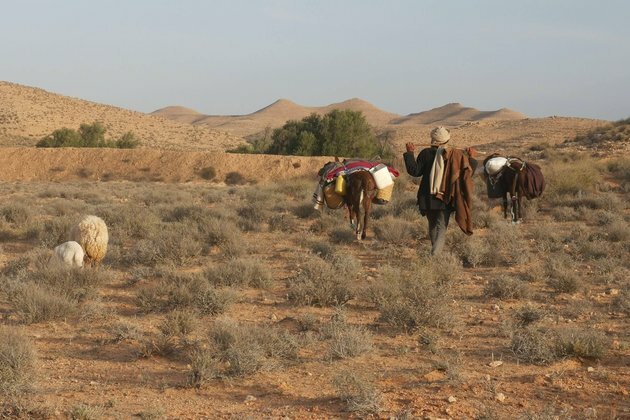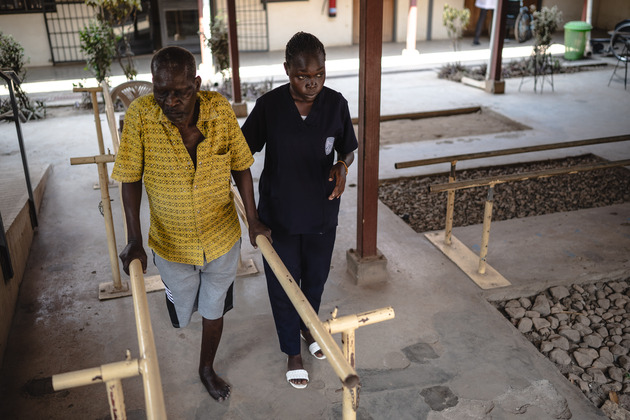How pastoral farming can help to avoid a biodiversity crisis
The Conversation
05 Dec 2022, 18:09 GMT+10

The world is losing its biodiversity. An estimated 41,000 animal species are now threatened with extinction. World leaders will convene at the UN COP15 biodiversity conference in Montreal this month to discuss ways of reversing this decline.
Participants are expected to adopt a global framework that sets out measures to safeguard biodiversity. One approach is to conserve 30% of the world's land and sea area through protected areas and other conservation measures in areas of limited human activity. Some campaigners are calling for this target to be met by the end of the decade.
But much of the land set aside for protection is occupied by indigenous people who may be excluded or displaced. Mobile pastoral farmers are one such group. Millions of pastoralists graze livestock across a variety of environments worldwide.
Case studies from around the world indicate that including pastoral communities in conservation initiatives can help to address the tensions that emerge around protected areas, while improving biodiversity.
The importance of pastoralism
The mobile grazing of livestock can be essential for maintaining the biodiversity of rangelands. Migrating livestock disperse seeds over large distances and fertilise soils with their dung and urine, encouraging plant growth. Light grazing and trampling of soil and grass can also allow areas of the ecosystem to regenerate following periods of intensive use.
Pastoralism can also support the survival of many important animal species.
Indian wolves are dependent on large spaces to roam. But in recent years their number has declined, leaving just over 3,000 in India's grasslands. However, the sheep and goats that are grazed by pastoralist communities in these grasslands are prey for the Indian wolf.
Livestock carcasses also provide a food source for endangered European vulture species.
Supporting conservation
The Pastres research programme, which I co-lead, explores how livestock herders are able to produce food on lands that some people dismiss as marginal, including savannahs, mountains and deserts. Taking care of the land is an essential part of their livelihoods. Pastres also highlights the intimate knowledge pastoralists have of the ecosystems in which they live.
Research shows how pastoralists can be partners in biodiversity conservation efforts.
For example, wildlife poaching has become a major challenge for conservation in parts of sub-Saharan Africa. The standard response has been to militarise conservation by arming rangers, and excluding people from wildlife areas.
Read more: Embracing uncertainty: what Kenyan herders can teach us about living in a volatile world
Yet pastoralists can reduce the incidence of wildlife poaching by acting as rangers. A scheme has been proposed in Kenya where pastoralists alert the authorities to commercialised poaching and protect water sources for joint use by wildlife and livestock.
Mobile pastoralism has long been an important component of ecological health in Spanish grasslands. The movement of livestock along rural routes called drove roads allow seeds to be dispersed over large distances in the fleeces and hooves of sheep. This enhances biodiversity and the connections between ecologically important areas.
In the same way, transfrontier parks - which are ecologically protected areas that span across country boundaries - allow for flexible use of grazing landscapes through movement. In southern Africa, the removal of fences allows both livestock and wildlife such as elephants and wildebeest to migrate across large areas and diverse environments.
Poorly managed rangelands where pastoral populations have been declining are also prone to dangerous wildfires. One study showed how pastoral farming declined in areas of Greece that were subject to wildfires between 1961 and 2017. Less livestock grazing has resulted in more dry biomass to fuel wildfires. In some areas, forest plantations have replaced pastoral grazing, further raising the vulnerability of these areas to fires.
Exclusionary conservation
The ecology of pastoral lands has long been misunderstood. Global assessments of the impact of livestock production often paint all livestock systems as the enemy of nature. The failure to differentiate between these systems has resulted in policymakers accusing pastoralists of contributing to environmental degradation.
Conservation interventions have been used as an excuse to evict pastoralists from their lands. Rangelands have been squeezed to make way for other projects as part of a wider pattern of "green grabbing" in recent years. Pastoral rangelands have been repurposed for environmental investments including forestry projects, carbon offsetting schemes, biofuel production and ecotourism.
But rangelands are often unsuitable for the tree-planting schemes proposed by those who advocate for the rewilding of pastoral areas. Pastoral practices challenge the conservation idea that the best kind of ecosystem is wild and heavily protected. As "open ecosystems", the natural state of rangelands is not closed canopy forests but a mix of grass and trees maintained by fire and grazing.
Such conservation schemes can also undermine the mobile use of rangelands, an approach that has helped pastoralists preserve these environments for centuries.
Through their flexibility, mobility and adaptability, pastoralists can operate successfully as part of nature. Research has shown how pastoralists can manage resources in ways that will benefit biodiversity conservation. It is these lessons that must be central to the discussion at COP15.
Author: Ian Scoones - Professorial Fellow, Institute of Development Studies 
 Share
Share
 Tweet
Tweet
 Share
Share
 Flip
Flip
 Email
Email
Watch latest videos
Subscribe and Follow
Get a daily dose of Madagascar Sun news through our daily email, its complimentary and keeps you fully up to date with world and business news as well.
News RELEASES
Publish news of your business, community or sports group, personnel appointments, major event and more by submitting a news release to Madagascar Sun.
More InformationAfrica
SectionDale Steyn backs Afghanistan to win ICC tournament in next decade
New Delhi [India], March 1 (ANI): Afghanistan's steady rise in international cricket has caught the attention of cricketing greats,...
"No need to manufacture news, world wants to know India": PM Modi at NXT Conclave 2025
New Delhi [India], March 1 (ANI): Prime Minister Narendra Modi on Saturday highlighted India's capability to efficiently organize large-scale...
Xinhua Photo Daily | March 1, 2025
BEIJING, March 1 (Xinhua) -- A selection of the best press photos from Xinhua. A drone photo taken on Feb. 27, 2025 shows the construction...
SOUTH SUDAN-JUBA-PHYSICAL REHABILITATION CENTER
(250301) -- JUBA, March 1, 2025 (Xinhua) -- A nurse from the International Committee of the Red Cross (ICRC) South Sudan delegation...
Indian Coast Guard Ship 'Sachet' departs for Sudan with over 2 tons of life-saving medicines
New Delhi [India], March 1 (ANI): The Indian Coast Guard Ship Sachet departed for Sudan on Friday, carrying over two tons of life-saving...
US tariff hike on vehicle imports could impact Nigeria's auto market
ABUJA, NIGERIA — For longtime automotive importer David Tope, Nigeria's auto market has become increasingly difficult. He used to...
International
SectionThree US female tourists found dead at Belize beach resort
MEXICO CITY, Mexico: Three American women were found dead over the weekend at a beach resort in Belize, police said. Officials are...
China launches live-fire drills after Vietnam's territorial claim
BANGKOK, Thailand: Chinese authorities said they started live-fire military exercises in the Gulf of Tonkin this week, just days after...
French warships join Philippines for South China Sea Drills
ABOARD THE CHARLES DE GAULLE, Philippines: France's nuclear-powered aircraft carrier and its warships arrived in the Philippines over...
Fresno State suspends two players, removes one amid gambling probe
FRESNO, California: Fresno State suspended two of its top men's basketball players last weekend and removed a third player from the...
Poland to continue covering Ukraine’s Starlink costs, says deputy PM
WARSAW, Poland: Deputy Prime Minister Krzysztof Gawkowski confirmed over the weekend that Poland has been covering the cost of Ukraine's...
Opinion - Israel's government exploited hostages
Israel sustained the West's support for its slaughter in Gaza for 15 months only through an intensive campaign of lies. It invented...













